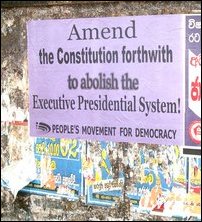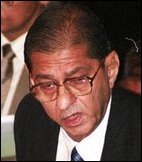
Sri Lanka’s referendum blues
[TamilNet, Wednesday, 23 March 2005, 12:23 GMT]
Opposition fears that President Chandrika Kumaratunga is making serious moves to hold on to the reins of power were further exacerbated when thousands of posters calling for the immediate abolition the country’s executive Presidential system appeared in many part of the island’s capital and suburbs this week. The purple coloured posters were in the name of a nebulous organization called ‘People’s Movement for Democracy’. Sri Lanka’s main opposition United National Party (UNP) says President Kumaratunga is planning to change the constitution to illegally perpetuate herself in power.
 |
| The posters in a Colombo suburb |
Asked about the posters, a UNP MP for Colombo told TamilNet: “Their colour shows who’s behind them”.
Ms. Kumaratunga and her husband, Mr. Vijaya Kumaratunga, left the Sri Lanka Freedom Party in 1982 and formed the Sri Lanka Mahajana Pakshaya (SLMP). The party contested the provincial council elections in 1988. The official colour of the SLMP was purple.

Earlier this month, President Kumaratunga announced that she wants to hold a referendum to obtain a mandate from the people for amending Sri Lanka’s constitution to abolish the executive Presidential system.
UNP reacted to this by saying that she wants to change the constitution to make herself the executive Prime Minister instead of retiring from politics when she completes her second term as President.
Her main coalition partner, Janatha Vimukthi Peramuna (JVP), heaped scorn on the President’s plans to hold a referendum to abolish the Presidency. JVP leader, Mr. Somawansa Amarasingha, said she could have done away with the executive Presidential system in 1995 if she was genuinely committed to restoring power to the people.

Addressing a public meeting in Chilaw Sunday, opposition leader Mr. Ranil Wickremesinghe said that the referendum proposed by President Kumaratunga would be a colossal drain on the country’s cash strapped economy at a time when the country is yet to remedy the ravages of the Tsunami. He charged it would cost hundred million rupees to hold the plebiscite.
Legal experts in Colombo argue that amending the constitution to abolish the executive Presidential system would be a complicated if not impossible process.
Others say that President Kumaratunga might resort to the extreme measure of holding a referendum to seek the people’s mandate to extend her term in office.
In 1982 President J. R Jeyawardene held a plebiscite to extend the life of his government by an extra six years after stripping his main opponent Ms. Srimavo Bandaranaike of all her civic rights.

He was elected Prime Minister when the UNP won with a massive landslide in 1977.
Mr. Jeyawardene used his overwhelming majority in Parliament to make a new constitution in 1978, under which he made himself executive President.
President Kumaratunga’s opponents fear that she too might use a referendum to extend her term.
“Normally a referendum under Article 86 of the constitution should be reviewed by the Supreme Court whether it is consistent with the law of the land. A referendum seeking the abolition of the executive Presidency would clearly be inconsistent with the provisions of the constitution. Hence, under normal circumstances the Supreme Court should rule that it cannot be held. But we do not know what the Chief Justice would do”, a political analyst in Colombo told TamilNet.
Sri Lanka’s controversial Chief Justice Mr. Sarath Nanda Silva has been accused by critics in the press of bending the law to suit President Kumaratunga’s political interests.
“She cannot do what Jeyawardene did because she does not have a decent majority in Parliament and the JVP’s support is uncertain. Jeyawardene had more than five sixths majority to back his referendum”, said Mr. Rajpal Abeynayake, deputy editor of the Sunday Times published in Colombo.
UNP says it will challenge the legality of any move by the President to tamper with the constitution with mass agitations and by filing action in court.

The opposition’s constitutional expert, Mr. K. N Choksy, says that the executive Presidency can be abolished only if President Kumaratunga gets the support of two thirds of all MPs in Parliament and the majority of the people at a referendum.
Articles three and four of the constitution have to be repealed or amended for abolishing the Presidency, according to him. These Articles can be repealed or amended only with the support of two thirds of MPs in Parliament and approval at a referendum.
President Kumaratunga cannot use a yes vote at a referendum to compel Parliament to support her move, according to him.
Some political analysts in Colombo opine that she could use success at the referendum to transform Parliament into a constituent assembly in which she can formulate a new constitution to suit her long term political interests.
“Article 76 of the constitution asserts quite clearly that only the Parliament has the sole right to make law, to legislate. The provision expressly prohibits Parliament from delegating or sharing its legislative authority. The Parliament is absolutely sovereign in this regard. Therefore a referendum that seeks the people’s approval for setting up a constituent assembly would be illegal. The Supreme Court would be compelled to declare it as such”, a pro UNP political columnist for a popular Sinhala weekly said.
“President Kumaratunga’s government has done precious little for the Tsunami hit people of this country. In this situation the masses will certainly be disgusted with her undisguised selfishness, her greed for power”, he added, saying that her political fate would be sealed if she goes ahead with a referendum.
Meanwhile, President Kumaratunga remains silent on the controversy she has triggered while her opponents keep anxiously guessing her next move to firmly hold on to the reins of power in Sri Lanka.









 Addressing a public meeting in Chilaw Sunday, opposition leader Mr. Ranil Wickremesinghe said that the referendum proposed by President Kumaratunga would be a colossal drain on the country’s cash strapped economy at a time when the country is yet to remedy the ravages of the Tsunami. He charged it would cost hundred million rupees to hold the plebiscite.
Addressing a public meeting in Chilaw Sunday, opposition leader Mr. Ranil Wickremesinghe said that the referendum proposed by President Kumaratunga would be a colossal drain on the country’s cash strapped economy at a time when the country is yet to remedy the ravages of the Tsunami. He charged it would cost hundred million rupees to hold the plebiscite. 
